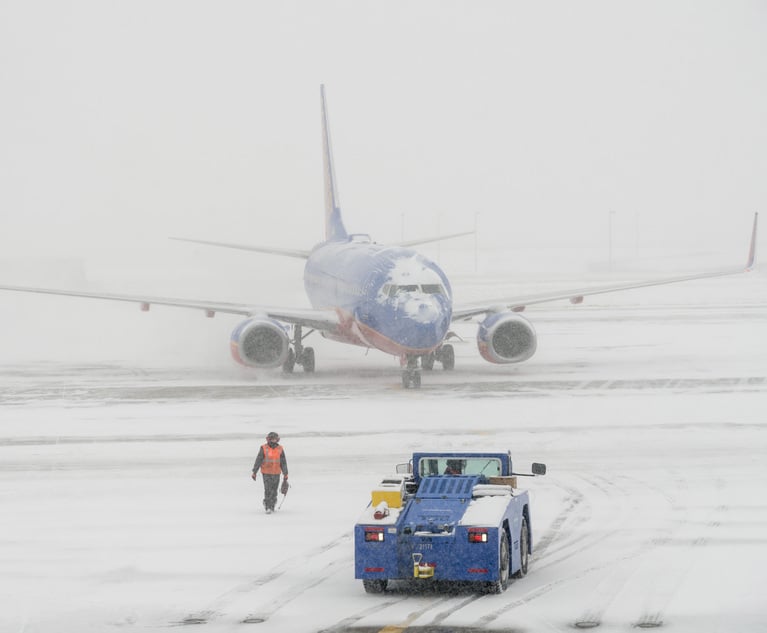GARA Still a Powerful Tool in Aircraft Litigation Cases
The next time you chose to fly, ask yourself—can I sue the manufacturer of this aircraft if it crashes as a result of a product defect? The answer is sometimes found in the General Aviation Revitalization Act (GARA) which was passed by Congress in 1994 in response to the enormous products liability costs that the tort system had imposed upon manufacturers of general aviation aircraft and their components, write James D. Gassenheimer, Ashley Dillman Bruce and Deborah B. Talenfeld.
August 21, 2017 at 12:12 PM
4 minute read
The next time you chose to fly, ask yourself—can I sue the manufacturer of this aircraft if it crashes as a result of a product defect? The answer is sometimes found in the General Aviation Revitalization Act (GARA) which was passed by Congress in 1994 in response to the enormous products liability costs that the tort system had imposed upon manufacturers of general aviation aircraft and their components. Congress believed that manufacturers of aircraft should not be exposed to the long tail of liability attached to their aircraft which are often used for many decades after they were first manufactured and sold. In short, GARA was intended to prohibit lawsuits based on claims for general aviation product liability that are brought more than 18 years after the date of delivery of the aircraft and/or component to the first purchaser. Courts have termed this statute as a classic statute of repose.
GARA was recently tested by a defendant in the Southern District of Florida. Twenty-three years after the first delivery of a Piper aircraft in 1977, the aircraft crashed in Canada and the plaintiffs claimed that a defect caused the crash. The defendant argued, based on the pleadings, that GARA entirely barred the action. On June 29, Magistrate Judge Edwin Torres issued 19 pages of findings recommending to District Judge Lawrence King that GARA applied to entirely bar the plaintiffs' claim. In finding that GARA applied, Judge Torres found that even if the law of the crash site applied, here a province in Canada, GARA's statute of repose would still bar the suit because of the Supremacy Clause of the United States Constitution.
This decision marks the first time in the Southern District of Florida that the GARA statute has been applied to entirely bar a claim involving a foreign accident. This view is entirely consistent with a Texas court finding GARA applied to an accident that occurred in British Columbia and a California court finding that GARA applied to an accident in Australia. Despite these authorities, plaintiffs still try to argue that GARA should not apply to accidents that occur in a foreign country. However, the cases relied on by plaintiffs usually involve statutes that create a cause of action rather than those that eliminate claims. And courts have found that interpreting GARA in such a way would have the unusual effect of preventing litigants from bringing an action in the United States for an accident occurring in the United States while allowing litigants to bring the same action in the United States if the accident occurred abroad. As a result, those arguments typically fail.
This content has been archived. It is available through our partners, LexisNexis® and Bloomberg Law.
To view this content, please continue to their sites.
Not a Lexis Subscriber?
Subscribe Now
Not a Bloomberg Law Subscriber?
Subscribe Now
NOT FOR REPRINT
© 2025 ALM Global, LLC, All Rights Reserved. Request academic re-use from www.copyright.com. All other uses, submit a request to [email protected]. For more information visit Asset & Logo Licensing.
You Might Like
View All
Southwest Airlines Faces $100M Class Action Over Pay Periods

Rogge Dunn Represents Florida Trucking Firm in Civil RICO Suit Against Worldwide Express
4 minute read
Fowler White Burnett Opens Jacksonville Office Focused on Transportation Practice
3 minute read
'A Fierce Battle of Expert Witnesses' Expected in Cybersecurity Spat
Trending Stories
Who Got The Work
Michael G. Bongiorno, Andrew Scott Dulberg and Elizabeth E. Driscoll from Wilmer Cutler Pickering Hale and Dorr have stepped in to represent Symbotic Inc., an A.I.-enabled technology platform that focuses on increasing supply chain efficiency, and other defendants in a pending shareholder derivative lawsuit. The case, filed Oct. 2 in Massachusetts District Court by the Brown Law Firm on behalf of Stephen Austen, accuses certain officers and directors of misleading investors in regard to Symbotic's potential for margin growth by failing to disclose that the company was not equipped to timely deploy its systems or manage expenses through project delays. The case, assigned to U.S. District Judge Nathaniel M. Gorton, is 1:24-cv-12522, Austen v. Cohen et al.
Who Got The Work
Edmund Polubinski and Marie Killmond of Davis Polk & Wardwell have entered appearances for data platform software development company MongoDB and other defendants in a pending shareholder derivative lawsuit. The action, filed Oct. 7 in New York Southern District Court by the Brown Law Firm, accuses the company's directors and/or officers of falsely expressing confidence in the company’s restructuring of its sales incentive plan and downplaying the severity of decreases in its upfront commitments. The case is 1:24-cv-07594, Roy v. Ittycheria et al.
Who Got The Work
Amy O. Bruchs and Kurt F. Ellison of Michael Best & Friedrich have entered appearances for Epic Systems Corp. in a pending employment discrimination lawsuit. The suit was filed Sept. 7 in Wisconsin Western District Court by Levine Eisberner LLC and Siri & Glimstad on behalf of a project manager who claims that he was wrongfully terminated after applying for a religious exemption to the defendant's COVID-19 vaccine mandate. The case, assigned to U.S. Magistrate Judge Anita Marie Boor, is 3:24-cv-00630, Secker, Nathan v. Epic Systems Corporation.
Who Got The Work
David X. Sullivan, Thomas J. Finn and Gregory A. Hall from McCarter & English have entered appearances for Sunrun Installation Services in a pending civil rights lawsuit. The complaint was filed Sept. 4 in Connecticut District Court by attorney Robert M. Berke on behalf of former employee George Edward Steins, who was arrested and charged with employing an unregistered home improvement salesperson. The complaint alleges that had Sunrun informed the Connecticut Department of Consumer Protection that the plaintiff's employment had ended in 2017 and that he no longer held Sunrun's home improvement contractor license, he would not have been hit with charges, which were dismissed in May 2024. The case, assigned to U.S. District Judge Jeffrey A. Meyer, is 3:24-cv-01423, Steins v. Sunrun, Inc. et al.
Who Got The Work
Greenberg Traurig shareholder Joshua L. Raskin has entered an appearance for boohoo.com UK Ltd. in a pending patent infringement lawsuit. The suit, filed Sept. 3 in Texas Eastern District Court by Rozier Hardt McDonough on behalf of Alto Dynamics, asserts five patents related to an online shopping platform. The case, assigned to U.S. District Judge Rodney Gilstrap, is 2:24-cv-00719, Alto Dynamics, LLC v. boohoo.com UK Limited.
Featured Firms
Law Offices of Gary Martin Hays & Associates, P.C.
(470) 294-1674
Law Offices of Mark E. Salomone
(857) 444-6468
Smith & Hassler
(713) 739-1250






